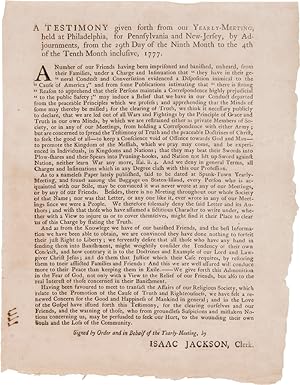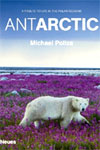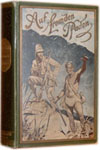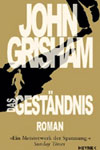A TESTIMONY GIVEN FORTH FROM OUR YEARLY-MEETING, HELD AT PHILADELPHIA, FOR PENNSYLVANIA AND NEW-JERSEY, BY ADJOURNMENTS, FROM THE 29TH DAY OF THE NINTH MONTH TO THE 4TH OF THE TENTH MONTH INCLUSIVE, 1777 [caption title]
[Quakers]: [American Revolution]
Verkäufer
William Reese Company - Americana, New Haven, CT, USA
Verkäuferbewertung 4 von 5 Sternen
![]()
AbeBooks-Verkäufer seit 13. Juli 2006
Beschreibung
Beschreibung:
Printed broadside, approximately 10â… x 8â… inches. Three horizontal creases from old folds. Light toning. Small piece of tape affixed to top of verso. Contemporary manuscript annotation on verso noting the year "1777." Near fine. A rare broadside concerning the so-called "Quaker exiles," the Philadelphia Friends who were rounded up, held without hearing, and banished to the Virginia frontier in 1777-1778, during the height of the American Revolution. Signed in type by clerk Isaac Jackson on behalf of the Yearly Meeting, the broadside calls for the release of "A Number of our Friends" who have recently "been imprisoned and banished, unheard, from their Families, under a Charge and Insinuation that 'they have in their general Conduct and Conversation evidenced a Disposition inimical to the Cause of America.'" In August of 1777, with Philadelphia under imminent threat of attack by British forces under the command of General Howe, Patriots and members of the Continental Congress were on edge. Suspicions ran high among those already inclined to see Quaker pacifism - their refusal to bear arms or to pay taxes in support of the Patriot cause - as evidence of their sympathy for the British. Many worried - rightly or wrongly - that the city's Quakers would not hesitate to aid the British if given the opportunity. Patriot suspicions seemed to have been confirmed on August 25, 1777, when the Continental Congress received a letter from Major-General John Sullivan reporting the discovery of several documents, signed "the Spank-town Yearly-Meeting," which seemed to implicate the Society of Friends in passing on sensitive military information to the British. Never mind that there was no such Yearly Meeting of Friends at Spanktown or that the documents were likely fabricated by someone intent on maligning Quakers. The letter, together with the incriminating documents, were immediately referred to a committee of three, consisting of John Adams, William Duer, and Richard Henry Lee. In their report, the committee concluded that the actions of "a number of [Quakers] of considerable wealth.render it certain and notorious, that those persons are, with much rancour and bitterness, disaffected to the American cause" and that, since those persons might be inclined "to communicate intelligence to the enemy, and, in various other ways, to injure the councils and arms of America," they therefore ought to be considered a risk "to the public safety" (Ford). In light of these conclusions, the committee recommended that "the executive powers of the respective states.apprehend and secure all persons, as well among the people called Quakers as others, who have, in their general conduct and conversation, evidenced a disposition inimical to the cause of America" (Ford). On August 28, the Congress approved the committee's recommendation. Three days later, on August 31, the Supreme Executive Council of Pennsylvania, in response to the Congress's resolution, called for the arrest of forty-one people. The prisoners were offered release on condition that they swear (or affirm) allegiance to the Commonwealth of Pennsylvania, but some refused. On September 10, the twenty remaining prisoners, nearly all of them either Quakers or disowned former Quakers, left Philadelphia to be taken to Virginia. Despite having obtained writs of habeas corpus from Chief Justice Thomas McKean of the Pennsylvania Supreme Court while stopped in Reading, Pennsylvania, the exiles' writs were denied, and the next day the Pennsylvania Assembly passed a bill suspending habeas corpus. The prisoners arrived in Winchester, Virginia, on September 29. They were released the following April in the face of mounting public pressure, but only after two of the prisoners had already died. The present broadside is a product of the "extensive publishing campaign" that helped secure the Quaker exiles' release (Whidbee). The broadside serves first to reiterate the Friends' position of pacifism and neutralit. Bestandsnummer des Verkäufers WRCAM63043
Bibliografische Details
Titel: A TESTIMONY GIVEN FORTH FROM OUR ...
Verlag: [Philadelphia
Erscheinungsdatum: 1777
AbeBooks ist ein Internet-Marktplatz für neue, gebrauchte, antiquarische und vergriffene Bücher. Bei uns finden Sie Tausende professioneller Buchhändler weltweit und Millionen Bücher. Einkaufen bei AbeBooks ist einfach und zu 100% sicher — Suchen Sie nach Ihrem Buch, erwerben Sie es über unsere sichere Kaufabwicklung und erhalten Sie Ihr Buch direkt vom Händler.
Millionen neuer und gebrauchter Bücher bei tausenden Anbietern
Neue und gebrauchte Bücher
Neue und gebrauchte Exemplare von Neuerscheinungen, Bestsellern und preisgekrönten Büchern. Eine riesige Auswahl an günstigen Büchern.
Antiquarische Bücher
Von seltenen Erstausgaben bis hin zu begehrten signierten Ausgaben ? bei AbeBooks finden Sie eine große Anzahl seltener, wertvoller Bücher und Sammlerstücke.
Versandkostenfreie Bücher
Hier finden Sie viele hunderttausend neue, gebrauchte und antiquarische Bücher, die Ihnen unsere deutschen und internationalen Händler versandkostenfrei liefern.



